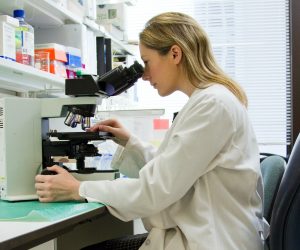
Novel Antibody May be Key to Better Lung Cancer Treatment
Abigail Klein Leichman via Israel21c – Researchers develop synthetic antibody that, when combined with common lung cancer drug, prevents relapse of adenocarcinoma tumors in mouse models.
Lung cancer is the leading cause of cancer-related deaths, and the most common form is a non-small-cell type called adenocarcinoma.
The main course of treatment today, a kinase inhibitor drug called Osimertinib, is effective for many adenocarcinoma patients. But after a year or more, the cancer usually develops resistance to the drug and the tumor can regrow.
Researchers from Israel’s Weizmann Institute of Science just reported their success in developing a novel synthetic antibody that, when combined with Osimertinib, prevents or slows drug resistance and the relapse of adenocarcinoma tumors in mouse models.
Lung cancer is the leading cause of cancer-related deaths
The results were published in Cell Reports Medicine.
“When patients take only the drug, there can be relapse and it’s very bad for the patient because the new tumors are more aggressive,” explains lead author Arturo Simoni-Nieves, a postdoc researcher from Mexico who worked on the project in the lab of Prof. Yosef Yarden, his faculty adviser and incumbent of the Harold and Zelda Goldenberg Professorial Chair in Molecular Cell Biology.
“The combination of the antibody and the drug targets two different proteins simultaneously in mouse models and helps us avoid the relapsing of the tumors,” Simoni-Nieves says.
This phase of the research project took about three years to complete.
“Our next task after testing is understanding the mechanism of how it works. Once we get that information, we can think about trying it with human patients,” says Simoni-Nieves. He expects this step to take another two or three years.

Future clinical trials would reveal whether this novel antibody can be developed into a new treatment for lung cancer that not only inhibits the disease but also helps prevent its recurrence.
“Osimertinib is the only treatment these patients have so far. Maybe with this antibody we can improve treatment,” says Simoni-Nieves.
Osimertinib is the only treatment these patients have so far
In addition to Simoni-Nieves and Yarden, the paper has 15 contributing authors, most from the Weizmann Institute as well as two collaborating researchers from the Graduate School of Pharmaceutical Sciences at Osaka University in Japan and three researchers in Italy, from the Department of Medical and Surgical Sciences of the University of Bologna and from the Università Cattolica del Sacro Cuore in Rome.
They concluded that their EGFR-AXL antibody “holds therapeutic promise.”
The study was supported by Merck KGaA, the Israel Science Foundation, the European Research Council, the Israel Cancer Research Fund and the Dr. Miriam and Sheldon G. Adelson Medical Research Foundation.
To read the original article click here.





